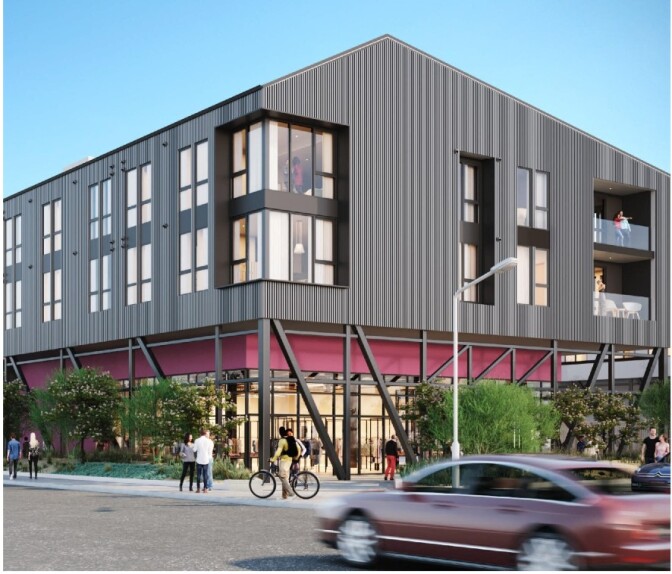This story is free to read because readers choose to support LAist. If you find value in independent local reporting, make a donation to power our newsroom today.
News Of 1980s Toxic Dumping Prompts LA To Order Testing Near Lincoln Heights Development Site

The Los Angeles City Council has ordered testing for toxic chemicals near a controversial Lincoln Heights development site.
The move comes after residents opposed to the project discovered that in the 1980s, more than 250 barrels of toxic waste were found buried around the property.
The city has given developers the go-ahead to tear down old warehouses and build a 468-unit apartment complex and retail space on the site, on Avenue 34 at the intersection with Pasadena Avenue, not far from Dodger Stadium.
Local opponents initially voiced concerns about gentrification, but that turned to worries about possible contamination as they learned more about the site’s past.
First there were concerns about contamination from a former dry cleaner that sat nearby. Then came the discovery that a firm called American Caster Corp. had illegally buried the 55-gallon drums filled with toxic waste — many of them corroded and leaking — around the site when it operated there. The story was first reported by the news website Capital and Main.
American Caster's president and vice president were sentenced to six months in prison, the site reported. It said the Los Angeles Times published stories in 1984 about crews conducting “a ‘speedy cleanup’ of the site in less than a day, removing barrels and contaminated soils before taking them to a hazardous waste landfill in West Covina.”
“There's a lot of unanswered questions about whether or not there are still barrels or other waste buried underground,” said Michael Hayden, president of the Lincoln Heights Community Coalition, a neighborhood group fighting the development.
“We do know that from the testing they've conducted that the levels of contamination are incredibly high,” said Hayden, an artist who lives in the neighborhood.
He was referring to testing done last year at the site that found highly elevated levels of volatile organic compounds.
The Lincoln Heights Community Coalition provided more details in a lawsuit it filed last week against the city and California’s Department of Toxic Substances Control, alleging they had failed to investigate the decades-old toxic waste and had devised an inadequate cleanup plan for the site.
According to the complaint, sampling done at the project site in 2021 identified “chemicals of concern” — including tetrachloroethylene, trichloroethene, vinyl chloride, and total petroleum hydrocarbons — at maximum concentrations that “for many of these constituents were found to be thousands of times higher than Screening Levels for Residential Air established by the Department of Toxic Substances Control.”
The L.A. City Council motion, approved last Wednesday, directs the Bureau of Sanitation to take the lead on organizing further testing of soil, wastewater and stormwater in the area around the site.
Mas Dojiri, an assistant general manager with the Bureau of Sanitation, told us in an email the plan is to carry out the testing "as soon as possible," although there's no timeline yet because the schedule is dependent upon other agencies.
One developer involved in the project, The Pinyon Group, took note in an email of the plan to conduct testing outside the boundaries of the development site. "We are moving forward on providing a safe project for our future residents and others who live, work, and learn in the community,” it said.
In a letter sent to the council Monday in his role as president of the Lincoln Heights Community Coalition, Hayden posed a series of questions about how the testing will be conducted and raised concerns that the city had not developed a specific plan for the testing.
“We insist that the public and our independent experts have an opportunity to review and comment on any sampling, testing and health/safety plans before such testing is implemented,” he wrote.
Patricia Camacho, who is part of the residents’ group, said it will insist that trucks hauling potentially contaminated soil and debris not be allowed to use Avenue 34.
“We were always told that … our street would not be used for that,” she said. “We are demanding that they use the exit from Pasadena Avenue so that this contaminated soil is not taken down Avenue 34 past our homes.”
In his letter, Hayden also accused the council of violating the Brown Act by passing the measure on an “emergency” basis, which allowed it to vote without first posting the item on the agenda. According to the motion, offered by Councilmember Gil Cedillo, “the need for action came to the attention of the City subsequent to the posting of the agenda for today’s Council meeting.”
Hayden wrote, “That is not true.” He noted his group had been calling for off-site testing since late 2020 and that the Capital and Main article about the 1980s toxic waste scandal was published last December.








